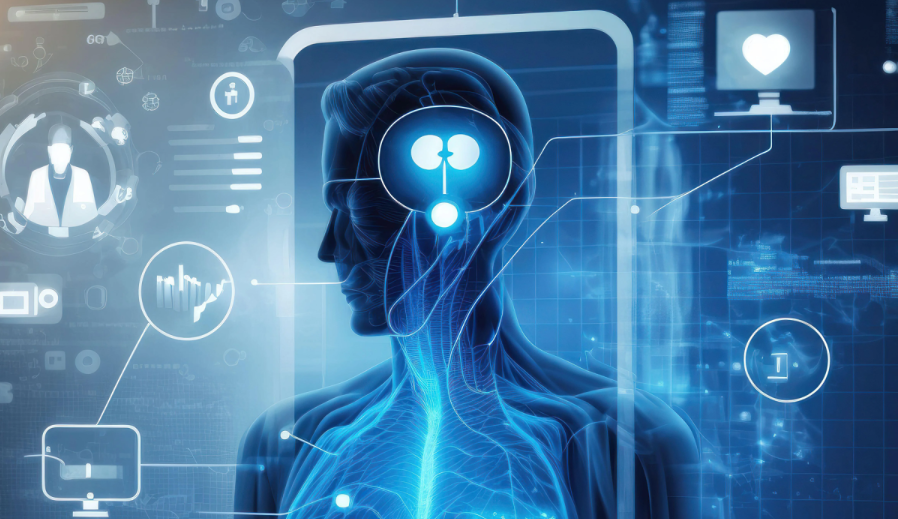Introduction
Artificial Intelligence (AI) is transforming the healthcare industry at an unprecedented rate. By 2024, AI’s integration into healthcare systems has significantly improved diagnostics, treatment planning, patient care, and administrative efficiency. This article explores the game-changing impact of Artificial intelligence in healthcare, highlighting the latest advancements and their implications for the future.
AI in Diagnostics
AI-driven diagnostics have become a cornerstone of modern healthcare. With the ability to analyze vast amounts of data quickly, Artificial intelligence tools are assisting doctors in diagnosing diseases more accurately and at earlier stages. For example, Artificial intelligence algorithms can detect patterns in medical images, such as X-rays or MRIs. That may be missed by the human eye, leading to earlier detection of conditions like cancer or heart disease.
In 2024, AI is being used to develop personalized diagnostic tools that consider a patient’s genetic makeup, lifestyle, and medical history. This personalization allows for more targeted and effective treatment plans, improving patient outcomes and reducing unnecessary treatments.
AI in Treatment Planning
AI’s role in treatment planning is also expanding. Artificial intelligence systems can analyze clinical data to recommend personalized treatment options based on a patient’s unique characteristics. These systems are particularly useful in oncology, where they can suggest the most effective chemotherapy protocols or identify patients who are likely to benefit from emerging therapies.

AI is also playing a significant role in drug discovery and development. By analyzing existing drugs and medical research, Artificial intelligence can identify potential new uses for existing medications, streamline the drug development process, and predict how patients might respond to new treatments.
AI-Powered Patient Care
Artificial intelligence is revolutionizing patient care by enabling more proactive and personalized healthcare. AI-powered wearable devices and remote monitoring systems allow doctors to track a patient’s vital signs and health metrics in real-time. This continuous monitoring helps in detecting potential health issues before they become severe, allowing for timely interventions.
In 2024, AI is also being used to create virtual health assistants that can answer patients’ questions, provide medication reminders, and even monitor a patient’s adherence to treatment plans. These AI systems improve patient engagement and empower individuals to take control of their health.
Administrative Efficiency and AI
Beyond patient care, Artificial intelligence is streamlining administrative tasks within healthcare organizations. Artificial intelligence tools are being used to automate scheduling, billing, and other routine tasks. Reducing the administrative burden on healthcare providers and allowing them to focus more on patient care.
Natural language processing (NLP) is another area where AI is making a significant impact. NLP algorithms can analyze clinical notes, medical records, and other unstructured data to extract valuable insights, improve coding accuracy, and ensure that patient records are up to date.
Ethical Considerations and Challenges
As AI becomes more integrated into healthcare, it raises important ethical considerations. Issues such as data privacy, algorithmic bias, and the potential for AI to replace human jobs are critical concerns that need to be addressed. Ensuring that AI systems are transparent, fair, and accountable is essential for maintaining trust in these technologies.

In 2024, the healthcare industry is also grappling with the challenge of ensuring that AI tools are accessible to all patients, regardless of socioeconomic status or geographic location. Addressing these challenges is crucial for ensuring that AI’s benefits are distributed equitably.
Future Outlook
The future of Artificial intelligence in healthcare is bright, with ongoing advancements promising to further revolutionize the industry. AI’s potential to improve patient outcomes, reduce costs, and enhance the overall quality of care is immense. As AI continues to evolve, healthcare providers must stay informed and adapt to these changes to fully leverage the benefits of Artificial intelligence.
Conclusion
AI is reshaping healthcare in profound ways, from enhancing diagnostics and treatment planning to improving patient care and administrative efficiency. By 2024, Artificial intelligence has become an integral part of the healthcare landscape. Offering innovative solutions to some of the industry’s most pressing challenges. As we look to the future, the continued development and ethical implementation of AI in healthcare will be key to realizing its full potential.













